
BANGALORE CHOIR – Civilized Good
Anthony Morgan
April 2012
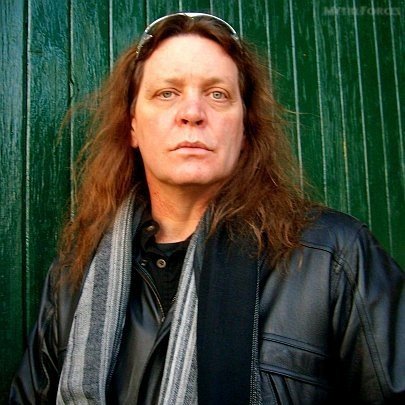
|
Fired from German heavy metal outfit Accept in late 1989, vocalist David Reece travelled to Los Angeles in a bid to track down potential musicians to work with. He discovered bassist Danny Greenberg and guitarist John Kirk through the Guitar Institute Of Technology in Hollywood, the latter having played with guitarist Curt Mitchell in Reno, Nevada as a member of Razormaid. To complete the outfit John telephoned Curt, who travelled to Los Angeles. Rusty Miller was initially on drums, but was shortly replaced by Darek Thomas Cava (ex-Brunette). This was how melodic rock outfit Bangalore Choir came into existence.
“It was crazy,” remembers David Reece, vocalist and co-founder of Bangalore Choir. “We had only played like nine shows in LA, and we had an offer from every label in the city. Giant / Warner Brothers came up to see us play at The Palace. They signed us, and then we started looking for producers. We started with Max Norman (Ozzy Osbourne / Megadeth), and it just wasn’t a pleasant experience so we got rid of him. We then got Jim Barton who has since worked with Queensrÿche, and Jimbo completed it. On Target (1992) did a few 100,000 units when it came out and then of course the tide changed, and pretty much hard rock was over with. It did really well though, and it’s amazing that that record has stood the test of time. We did Firefest a couple of years ago; we played probably 50% of that record live, and everybody knew the words and were asking about it. They had the initial pressings, and everything. It did well.”
The tide in question temporarily claimed the life of Bangalore Choir, the assortment’s demise lasting roughly 15 years. “We had Whitesnake’s management,” the mainman explains. “We were on one of the biggest labels in the world and eight weeks after release they dropped us, and we were told that basically hard rock is finished, get a real life, and get a new job. With the pressures internally created by that and being told that they weren’t going to support us, the band just frittered away. I stayed in Los Angeles and did some other things, but I got out of music for about ten years.
“If you do it for as long as I have and you get out of it though, it’s still a part of you. You can’t completely walk away. I missed it terribly the whole time. A friend of mine contracted MS (multiple sclerosis) in Twin Cities, Saint Paul in Minneapolis, Minnesota where I kind of started. I was phoned up by some guys who asked me if I would come there, and just record before this guy passed. Fortunately he’s still alive. He’s not doing very well, but… I did a bunch of recordings with those guys (Dare Force) just for fun, and they posted it on the net. The next thing you know I’m starting to get offers from record companies. I got an offer from Martin Kronlund to come over to Sweden and do the Gypsy Rose record (June 2008’s Another World) back in 2007, so I decided to do it. Since then I’ve been working like an idiot.”
August 2009 solo album Universal Language is among the work David has undertaken. “I moved back to Germany, and was in my favourite pub,” he divulges. “Andy Susemihl walked up behind me, and said ‘Hey, we should do some writing together.’ One thing led to another, and that’s where Universal Language spawned from.”
Further solo material might be in the pipeline. “It depends on the label,” the singer reckons. “If AOR Heaven wants another one, I’ll do it. I’m really excited about Metaphor and promoting this record. Right now, I’m writing with some young guys. We’re doing a really heavy thing; it’s reminiscent of what I did with Accept, the reason being because a lot of my fans have asked me to go back to that. I don’t know if it’s a solo album or if it’s a group project, but it’s killer. I’m really happy with it. If that turns into a solo record, then cool. If not, I would love to do a solo record. I don’t know how much longer I’ve got on this earth to do records (laughs), but I would love to do another one.”
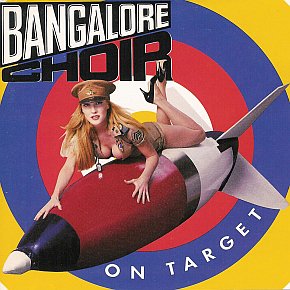
|
David’s sole outing as an Accept member was May 1989’s Eat The Heat. “The good of it was in those days I played seven days a week, five hours a night in America,” he recalls. “You had to emulate a lot of the singers you were copying, so you went out, you had a strong voice, and you sang every night, but you kind of lost your identity. You didn’t really know if you’re a singer or not, or if you could hit the notes. When I got into Accept Dieter Dierks really worked me as a singer, and the result of that was I developed my own style. That’s one of the good things. Some of the bad stuff was I was never really comfortable in the group, and trying to replace Udo (Dirkschneider) is a difficult thing. Nobody really can; it’s not really Accept without Udo. That’s some of the bad, but overall, learning the work ethic and what it takes to be professional and do it was good. It was a whole different atmosphere for me. They don’t mess around (laughs).”
A physical altercation with bassist Peter Baltes brought the frontman’s Accept membership to an abrupt conclusion. “I punched him in the face,” he admits. “We didn’t get along, and I had had enough of the banter for a few years. It was just a two-year culmination of never feeling welcome – they were never happy. It’s hard to remember what was said, but it just wasn’t a good situation. A lot of gossip, innuendo and typical band stuff happened, and it came to a boiling point. One thing led to another, it became physical, and I was fired. That’s really all I can say about it. I regret that decision, but I’m glad to be out of that scenario. It was never comfortable for me.
“It was definitely a plus though. When you sing for a group with the name Accept, everybody knows who you are. I definitely respect the fact that it put me on the map, and launched my career. That was 25 years ago, so I think I’ve done enough since then to prove that I can stand on my own. But yeah, I definitely accredit that move for putting me where I am. Had I not done it, who knows where I would have gone.”
Bangalore Choir’s rebirth was partially inspired by the enquiries of a specific record label. “Georg Siegl at AOR Heaven had asked me what the possibilities of re-releasing On Target were, and I had to do some wrangling to find out if it was possible,” David acknowledges. “I found out that it was okay, and then I said ‘You know what? I’m gonna try to reach out to these guys.’ I really felt like we never finished what we started, and it was really cool. There was a lot of water under the bridge; we were all glad to speak to each other. I had actually written a lot of those songs with Andy Susemihl for that record, and then we asked Danny and Curt to contribute to it. That kind of opened the doors for a reunion, and then one thing fell together after another. Kieran (Dargan) had asked me at Firefest if I could put the band onstage, but I could only guarantee myself, Curt, and Danny. That was fine, so it was cool. Everything fell into place, and since then we’ve done some summer touring together last year. We plan to go out this fall in Scandinavia and hopefully the UK and Germany, but as you know, touring is a mess right now.
“It seems like every day you hear of a new club closing. You book dates at some clubs, and then you find out a week later they’re shutting their doors. I think the recession is a big part of it, of course. Another big part of it too is I see a lot of the fans – because of the recession – stay at home, and they can watch the show on YouTube within hours after you’re done. A lot of people just stay at home, fish around, and see it that way.
“I think YouTube doesn’t help as well, like I said earlier. With the drinking laws in America, if you drink a couple of beers and you’re stopped then you’re going to jail. For somebody to go out and spend their money on tickets when they can sit at home, drink a beer and watch the show on YouTube literally minutes after you’re done… I think that’s murdered us, and a lot of the American acts. I just did a show with Vince Neil (Mötley Crüe vocalist) a couple of weeks ago with this young outfit that I’m working with; there were about 2,000 people there, but they had expected twice that for the show. I got home at midnight, and about an hour later I could see pretty much everything I’d done. It’s killing us, and the illegal downloading of records through the internet is killing us too.
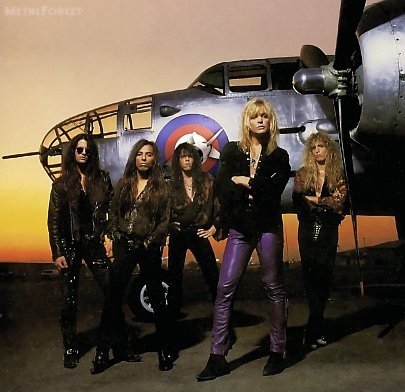
|
“There are about 10,000 sites right now that have got Metaphor. Unfortunately, I think some of the journalists who get the promo CDs and the people who pretend to be DJs who get the promo CDs upload them when they’re not really official people in the industry. They don’t realise the harm they create. I think the mentality of society is take, take, take – it’s not like when I was young. I really liked going to buy records and spending the day listening, following a band, and reading the liner notes. I think everything is so fast that the attention span has died. The loyalty has gone. It’s better in Europe I would say; the fanbase that I have in Europe is far stronger than in the US.”
“We don’t really have the strength though to command the promoters to say ‘Okay, we’re gonna put this out and do this.’ It’s two ways. We’re well known, but I don’t think we’re well known enough to get that. I was just talking to Andy about it not long ago, who’s in Germany right now. Of course we all wanna tour, and we were just talking about how frustrating it was. We had momentum in 2010 after Cadence came out; we went out with UFO in Europe, and then of course there was Firefest. We did some other dates in Europe as well, but it seemed like everything just fizzled out.”
Bangalore Choir’s sophomore record finally arrived in September 2010, entitled Cadence. Third album Metaphor saw the light of day in April 2012. “I thought it was a good stepping stone to put the guys back together,” the lyricist muses. “I think Metaphor is a stronger record. I’m proud of Cadence; there’s some moments on that record… to be honest I’ve done a lot of records in my life, and with every record I always wish I could’ve done more. After you listen to it when it’s finished and you’ve laboured, you always feel you could’ve done better. With Metaphor it’s more of a group effort, everybody writing material. I feel stronger about Metaphor right now, which I think is a little more in line with On Target. Melodically, I think there’s some more similarity there. There’s still some of the Cadence elements. I don’t know if you would agree with that, but I think because the band was totally more involved on Metaphor it feels a little more natural to me. I wasn’t the main songwriter like I was on Cadence. I kind of opened the door on Metaphor and said ‘Everybody bring your ideas,’ and that’s the way I wanted it. I think you hear that on Metaphor. It’s a stronger record, I think.
“I started submitting things to Andy, and then on the phone I would sing the melody idea. Andy would flesh the thing out with guitars and the drum loop, and then he would send it to me. I would then do my thing, and then we would send it to Curt Mitchell in Reno, Nevada. Danny lives in Albuquerque, New Mexico, so he would fly up to Reno and they would arrange their ideas to it. It’s an all round world experience (laughs). We’re spread out all over the place; I’m in Minneapolis right now, and it’s just crazy. That’s how it came together.
“While we were doing it, Curt would say ‘I’ve got this kind of bluesy, country thing I want you to sing to.’ He would send that to me, and that’s where the song ‘Never Face Old Joe Alone’ came from. ‘All The Damage Done’ was Curt’s. I also wrote with Rikard Quist again out of Sweden; he and I collaborated on the last Reece-Kronlund album (Solid), and I think the guy’s got an amazing talent. I think if he breaks out, he could write a hit song any minute. It all fell apart and fell together at the same time (laughs).”
Additional personnel handling songwriting duties arguably resulted in a more varied affair. “When you get a guy like Curt Mitchell writing songs, playing guitar, really focusing and being more involved, I think it really shows,” David enthuses. “The guy’s a monster. Yeah, I think so. It’s really difficult. I could take everybody and put them together in a room for two weeks in America, but then everybody has their normal lives that they have to take care of. It’s not like the days before where we lived down the street from one another, and we rehearsed every night. We’re older, have children, and have mortgages. It’s a different scenario, a different lifestyle now. I wish it was like the old days to be honest. I wish the band was doing six months out of the year in a touring van or a bus again. To me that’s magic, and what you come up with is unbelievable.”
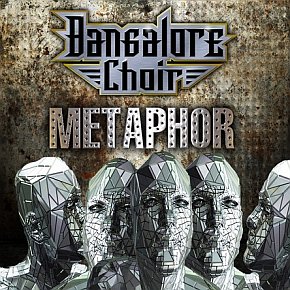
|
Rikard Quist collaborated on the tracks ‘Silhouettes On The Shade’ and ‘Scandinavian Rose’. “It’s kind of the same as I do with Andy, and Curt,” the vocalist says of the collaboration. “Rikard actually was a part of Gypsy Rose when I came back to music. Martin Kronlund owned a studio in a music store, and Rikard was a keyboard player for Martin. He also managed the music store which was in the same building, and I never really listened to what he was saying. He would say ‘I’ve got some songs,’ and then one day I just sat down and jammed with him. I said ‘Wow, this guy’s really melodic – he’s got a great ear.’ He plays multiple instruments, and he sings fairly well.
“For Reece-Kronlund, I had this concept for the song ‘Samurai’ (from June 2011’s Solid). I wanted to do an Asian feel on keyboards, some melodies. I just hummed it to him, and what he played was exactly what was in my head but I couldn’t express it. With ‘Silhouettes On The Shade’ and ‘Scandinavian Rose’ on Metaphor, I pretty much had the titles of the songs and some of the lyrics worked out, some average melodies, blah blah blah. I hummed those melodies to him, and that’s what he came across with. I think he’s a force to be reckoned with. I understand he’s doing a record for an English label. I don’t know who that is yet, but I hope he does well.”
Not all of the compositions David and Rikard penned together surfaced on Metaphor. “There are two or three others that I recorded that I think are more geared towards if I do a solo album,” David confirms. “I think when you open the floodgates with guys and say ‘Hey, I’ve got a deal. Let’s start recording… This is what I’m thinking,’ then everybody starts going ‘Yeah, yeah, yeah. Let’s get to work.’ So yeah, I was focused mainly on Bangalore Choir for Metaphor. I love that band, those guys. Andy Susemihl and Curt Mitchell are two of the finest guitarists that I’ve ever been around. As you listen to the record, some of the guitar work I think is amazing. Those guys are great.”
Lyricist Jon Wilde lent his services to Metaphor as well. “I wrote a lot of lyrics for the Reece-Kronlund album Solid with him,” the mainman notes. “That’s when I realised ‘This guy is clever. He’s got a good way of writing a story that works. If you listen to a lot of my lyrics, it’s important for me to… I’m not into ‘Ooh, baby baby,’ those kinds of lyrics. I’m into stories, and Jon helped me because – like I said – I’ve done 16 or 17 records in my life. It’s not easy to be fresh all the time. I have titles in my head all day long, but after you’ve done a lot of writing you tend to write using the same words if you’re not careful. It’s hard to be fresh, and easy to become redundant. Jon opened the door for me and gave me insight into taking the story into a better and fresh direction, and I hope to write with Jon more. Jon and I are writing lyrics right now for this new project that I was telling you about. I’m calling the project Waiting For War. It’s very heavy, kind of melodic Judas Priest meets Avenged Sevenfold, so that’s cool. I’m really enjoying it; the stories are deep, and the hooks are there. Jon’s got another future. I’ve helped Jon, because he’s writing for other artists as well.”
Waiting For War’s birthplace was Minneapolis, Minnesota. “I started in the music business here in Minneapolis when I was 17,” David begins. “The drummer Eric Domagall has a band called Downtread, and they have a guitarist named Brett Petrusek. They’re just monsters; they’re fresh, they’re hungry. They’re maybe 10 years younger than I am, and I’m 50, so… these guys have played around the area. They have a recording studio that’s like the old days. The band is always together because they live in the same city; they play a lot of shows, and play a lot of open airs for a lot of the big acts that come through the Midwest.
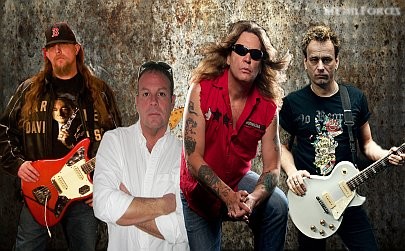
|
“I had gone down to the studio called Pound Sound, and a guy named Jeremy Tappero tracked the vocals for Metaphor. He played some of this band’s music, who were Downtread. I said ‘Who is that?’ He told me who it was, and I said ‘Those guys are great. I’d love to sing on some of their stuff.’ He goes ‘Well, that’s kind of interesting you said that. They’re fans of yours, and they would like you to record with them a little bit.’ One thing led to another, and then we sat down in a room and just started writing songs. Right now we’ve finished the third one completely, and there’s six more that are floating around. Hopefully, I’ll make a record with these guys this year. I’ve put the feelers out to let record labels know what I’m doing. They’ve said ‘As soon as it’s done, we wanna hear it first,’ which is great. It’s nice to have that opportunity (laughs).”
Guest appearances by the singer are firmly in the pipeline. “I sang on Christian Tolle’s record, and Paul Shortino and Michael Voss is on that record as well,” he elaborates. “It’s called The Higher They Climb I believe, and that was released in March. I did a record (Identity Crisis, Kivel Records) for a group out of New York called Tango Down. I did that in 2010, and it’s gonna be released in May. Actually I just went to New York in late March, and we opened for Y&T and Twisted Sister. We did three dates on the East Coast, which was a lot of fun. That’s more of a commercial, pop / hard rock record than what I’m doing now, and that’s coming out this year. I did a song on a concept record with a guy out of Norway. I’m not sure when that’s coming out, but it’s supposed to come out this year. I like to stay busy (laughs).”
David’s vocal services are in great demand. “I hope so, and some people criticise me for that,” he confesses. “You know what? I tell them to fuck off, because I’m a singer and in this climate you take what you can get. I’m not gonna take shit but if something’s good, they offer me decent pay, and it’s something that’s gonna be on an album, then I’m gonna do it. I really don’t care what anybody says. I wanna work.
“It’s the same with Jeff Scott Soto. He gets criticised for singing on a bunch of records, Joe Lynn Turner gets criticised. What people don’t remember though is that Bangalore Choir is my baby, but if I was to rely on that then slowly I wouldn’t be doing very much. Rock ’n’ roll is a funny business. You have your hardcore fans who say ‘You shouldn’t do this. You should restrict things to Bangalore Choir,’ and to me it’s all music; I wanna make music, so that’s why I continue to do it. They think you should stay true to one thing. I then have others who say ‘Hey, the more the better. Keep making songs, and keep recording,’ others like yourself who think that if somebody has sent you a good song and put a microphone in front of you, let’s see what you can do to make it work. I just choose to record more.”
Metaphor was released on April 27th, 2012 through AOR Heaven.
Interview published in April 2012.
Related Posts via Categories
- SCOTTISH SICKNESS – A Report On The Scottish Death Metal Scene, Featuring BRAINBATH, PUTRID FATE And RANCID CADAVER (October 2022) | Features / Interviews @ Metal Forces
- LARVAE – Join The Hardcore Cult! (June 2022) | Features / Interviews @ Metal Forces Magazine
- TRENCH FOOT – Sacrificing Morals For Gory Obscenities (June 2022) | Features / Interviews @ Metal Forces Magazine
- L.A. GUNS – Trigger Happy (March 2019) | Features / Interviews @ Metal Forces Magazine
- CANCER – Crimes So Evil (November 2018) | Features / Interviews @ Metal Forces Magazine
- U.D.O. – The Tank Drives On (August 2018) | Features / Interviews @ Metal Forces Magazine
- SIEGE OF POWER – Bleeding For The Cause (August 2018) | Features / Interviews @ Metal Forces Magazine
- MOONSPELL – A Taste Of Live Eternity (August 2018) | Features / Interviews @ Metal Forces Magazine
- MONSTROSITY – Dark Matter Invocation (August 2018) | Features / Interviews @ Metal Forces Magazine
- SATAN – Five Magicians (August 2018) | Features / Interviews @ Metal Forces Magazine
|
|





